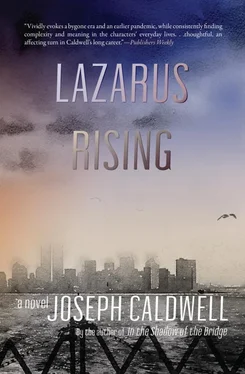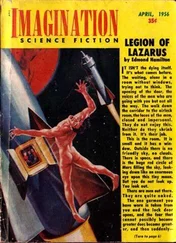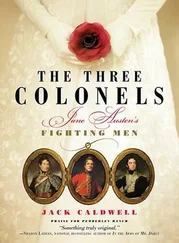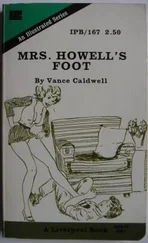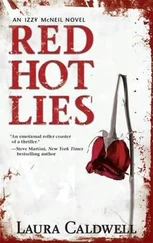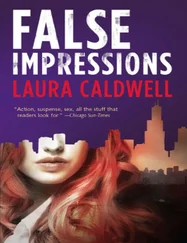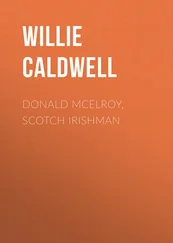The soup was hot and the vegetables firm. Dempsey knew that a fat man who made noises when he ate was sitting across from her, a woman and a child were seated down the table, and next to her was someone who clutched his spoon in his fist and whose elbow showed through the sleeve of an unbuttoned sweater. Dutifully she ate the soup and the bread, generously buttered. As if at a signal, she lifted her coffee to her lips and drank.
Now music could be heard, far away. Someone was playing the organ in the church above. No complete measure came through the basement ceiling, only occasional phrases, as if the waves of sound were advancing, then receding, trying to draw her closer, away from where she was. The music was coming from the church where she was going to marry Johnny. The idea seemed a strange one. She knew she loved him and had said she’d marry him. She had wanted to marry him. But that now seemed so long ago and Johnny himself seemed so remote, so distant, a man from another life for whom she was desperately trying but as yet still could find no place in the life she was living now. He was the finest man she had ever known. He was probably the only man she had ever loved. He was kind, he was brave; he was beautiful and gentle; he was passionate and had rust-colored pubic hair, which seemed to her highly erotic. Johnny had taken care of her when she was sick; he would stay with her until she died. But she was no longer dying. Johnny had prayed for a cure and his prayer had been answered. She could live on and on and on. But Johnny had no purpose now.
Why, she berated herself. Why? If in dying, she had loved him, why in living did she barely know him, much less feel the depth of what she’d felt before? Why had he become undefined? Why did her need for him no longer exist? The diminishing of her feeling for him was even more of a mystery than the fact that her own death was now in the distance, as undefined as Johnny was now undefined—even up close.
It was time for another few sips of coffee, but Dempsey felt no inclination to drink. She would wait. The moment would make itself known when it arrived. She would then raise the cup, put it to her lips and take a good healthy gulp. She waited. The moment did not seem to be coming any closer. She waited longer. Maybe, if she took in a few more spoonfuls of the soup or took a bite of the bread—but no, it would be inappropriate. Dempsey continued to wait for the moment when she would drink her coffee. It seemed unfair that the signal was being withheld. Then she decided she would leave. She would submit no longer.
She stood up, took her tray in her hand, and reached down for her tote. It wasn’t there. She looked under the table to see if it had slipped away from the side of her chair. It wasn’t under the table. She looked around the leg of the chair occupied by the man with the unbuttoned sweater. He was young with mussed-up hair. The tote bag was nowhere to be seen. She looked behind her and in front of her and to both sides of her. No one paid her the least attention. She was about to ask if anyone knew anything about the disappearance, but she knew it would do no good. No one knew anything. The tote bag was gone. It had been intended that it should be gone. She must ask for no explanations, she must demand no knowledge. And most of all, she must not expect it back.
A rage began to rise in her. She had been robbed. Something had been taken from her. The injustice, the violence against her must not pass without protest. She would cry out; she would denounce and demand; she would accuse and condemn. But then the rage subsided before she could give it utterance. It ended as if by some abrupt command. Like the tote bag, it was nowhere to be found. She had come to this place to quietly surrender the bag, to have it taken from her and never returned. She had come among these people because they were her own. From each, something had been taken and would never be found again. The search had been long abandoned and completely forgotten. It remained for Dempsey to leave quietly, to make as little noise and move with as little motion as possible. The time had come to resume her ordinary life, her usual living. She must phone Johnny. The painting of Lazarus resurrected must be started. And finished.
Carefully she slid her empty chair back into place at the table. Her untouched peach slices she left for anyone who might want them. Looking neither to the left nor to the right, she brought her tray to the stacking area and performed the required protocols: the leftover soup, less than half a bowl, the unsipped coffee, the last morsel of bread thrown into the garbage; the bowl, the spoon, the tray deposited on the stainless-steel counter, a murmured thanks. A huge man with a great shining bald head, bent over the sinks, called back, “You’re welcome. Come again,” without turning around.
Dempsey walked toward the door. People were still arriving. These were the ones she should thank: these and the man with the black plastic bag, these and the man with the unbuttoned sweater, these and the woman and the child. They had allowed her to be with them. They had accepted her as one of their own, the robbed, the pillaged, the violated. As she walked through the door she murmured the words, “Thank you… thank you,” to the new arrivals. No one seemed to find this anything but ordinary and perfectly acceptable.
Dempsey and Johnny were walking past the old Custom House, now a museum dedicated to the dispossessed indigenous Americans. When Dempsey had phoned Johnny, she told him that she had finally decided to at least try to get started on the final painting of her memorial to Jamey, The Raising of Lazarus . She had asked if he could come sometime soon to pose, which, in turn, might help her find the truth at the heart of the miraculous event which, only she, as an artist, would know.
He’d told her he was busy repairing the roof of his mother’s house. With a laugh, he mentioned that he was, during his off time, going from one task to another to keep his mind off more important things. As a matter of fact, he’d already fixed the fence that separated the yard from the sidewalk.
Now, at her request, he told her that he was on duty that evening but would come immediately and give her what time he could. He wouldn’t even bother to shower and hoped she wouldn’t mind.
Dempsey protested that it wasn’t all that urgent, but Johnny told her he was already on his way. Dempsey said in that case, the least she could do to show her appreciation was to meet him at the ferry.
Although he didn’t mean it, Johnny said, “That won’t be necessary.”
“That’s why I’m doing it.”
It pleased Johnny to say, “Well, if you insist.”
When he came down the ramp from the terminal, Dempsey saw that he’d meant what he’d said. His jeans were stained with tar from the roof, great swatches across the knees and lesser splotches dabbed near the pockets and up and down the right leg. The left leg, for whatever reason, was unspotted. His T-shirt was immaculate, and she suspected he had taken time to shower after all. Her suspicion was disproved when, after a clumsy raising and lowering of elbows and hands, they’d gone into each other’s arms. His body smelled like beef stew. When they’d separated for the obligatory look at each other, they avoided each other’s eyes. Because Dempsey was concentrating on his right cheek, she could tell that he was examining her forehead. They’d smiled, they’d hugged once more, and they’d turned and begun their walk to the loft.
After they got to Bowling Green, Dempsey looked a little bit toward her left. Johnny was staring straight ahead. His mouth was open. Was he going to say something? But he didn’t. He simply closed his mouth, then looked down at the sidewalk.
Читать дальше
